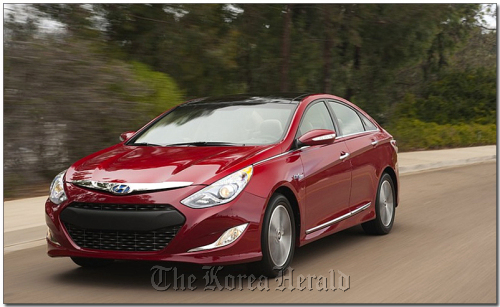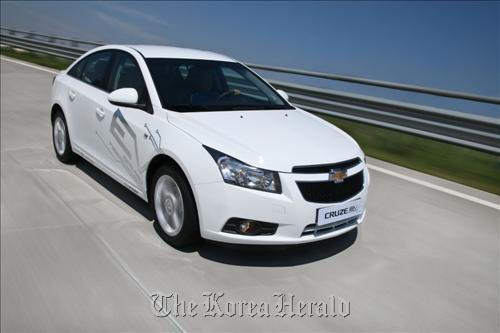LG Corp.’s announcement that it will jointly build electric cars with General Motors Friday is brining hope to Renault Samsung, which wants to sell the vehicles here.
However, the debate over next-generation cars remains very much alive with Hyundai on the hybrid side.
Lee Ki-sang, director of Hyundai’s R&D, had revealed the company would be tossing away their electric car project to concentrate on hybrids.
“All-electric vehicles will be a feasible option only in two or three decades’ time. Hyundai Motor Group will be focusing on developing hybrids for the time being,” Lee told an auto conference on Aug. 25.
“The cost of lithium-ion batteries essential to replace gasoline is too high and it covers a short distance. Lack of charging infrastructure is a big problem too,” he added.
However, the debate over next-generation cars remains very much alive with Hyundai on the hybrid side.
Lee Ki-sang, director of Hyundai’s R&D, had revealed the company would be tossing away their electric car project to concentrate on hybrids.
“All-electric vehicles will be a feasible option only in two or three decades’ time. Hyundai Motor Group will be focusing on developing hybrids for the time being,” Lee told an auto conference on Aug. 25.
“The cost of lithium-ion batteries essential to replace gasoline is too high and it covers a short distance. Lack of charging infrastructure is a big problem too,” he added.

Hyundai and its affiliate Kia Motors Corp. are the fifth largest carmaker in the world.
There are two major problems in delivering all-electric cars. First, a battery that is as efficient as a tank of gasoline. Second, creating enough gas stations offering electricity for the fuel-cell vehicles. Current lithium-ion batteries equal to a tank of liquid fuel are too big, heavy and expensive to commercialize.
The Korean unit of French automaker Renault SA argues the ideas needs state support.
“The biggest obstacle in electrifying automobiles is with the lack of power-grid infrastructure. The energy from households doesn’t easily let drivers to charge for their electric cars,” Yoo Seung-kwon, a senior official at the Korean unit, was quoted as saying.
“And the electric cars will come relatively pricey. We’re expecting government subsidies to reduce burden on buyers,” he added.
Renault Samsung plans to produce 13,000 SM3 ZE electric subcompact vehicles from its Busan plant until 2015. The Ministry of Knowledge Economy earlier this month said it will spend about 70 billion won ($65 million) on electric-vehicle development by 2014, including building of electric charging stations.

GM made the latest push to enhance the battery technologies.
Cho Juno, president and COO of LG Corp. on Friday inked an agreement with GM to develop the core components and solutions needed for next-generation electric cars GM currently is working on.
LG will be responsible for improving on-battery chargers, climate control systems and everything that helps GM spearhead electric and electric-hybrid car market.
“LG is a leader in consumer electronics; we’re a leader in cars. We want to push the envelope on electric cars further, so we’re going to share responsibility and our expertise in each of our fields. They’re a nontraditional partner, and they think differently than we do,” GM vice chairman Steve Girsky was quoted as saying.
LG Chem, an affiliate of LG, currently supplies lithium ion battery cells for GM’s Chevrolet Volt and Opel Ampera battery-powered cars.
GM Korea, the local unit of General Motors, said it plans to develop three kinds of electric vehicles in Korea based on Chevrolet Spark, Chevrolet Cruze sedan and Chevrolet Orland SUV.
By Cynthia J. Kim (cynthiak@heraldcorp.com)








![[Graphic News] More Koreans say they plan long-distance trips this year](http://res.heraldm.com/phpwas/restmb_idxmake.php?idx=644&simg=/content/image/2024/04/17/20240417050828_0.gif&u=)
![[KH Explains] Hyundai's full hybrid edge to pay off amid slow transition to pure EVs](http://res.heraldm.com/phpwas/restmb_idxmake.php?idx=644&simg=/content/image/2024/04/18/20240418050645_0.jpg&u=20240419100350)





![[From the Scene] Monks, Buddhists hail return of remains of Buddhas](http://res.heraldm.com/phpwas/restmb_idxmake.php?idx=652&simg=/content/image/2024/04/19/20240419050617_0.jpg&u=20240419175937)

![[KH Explains] Hyundai's full hybrid edge to pay off amid slow transition to pure EVs](http://res.heraldm.com/phpwas/restmb_idxmake.php?idx=652&simg=/content/image/2024/04/18/20240418050645_0.jpg&u=20240419100350)

![[Today’s K-pop] Illit drops debut single remix](http://res.heraldm.com/phpwas/restmb_idxmake.php?idx=642&simg=/content/image/2024/04/19/20240419050612_0.jpg&u=)